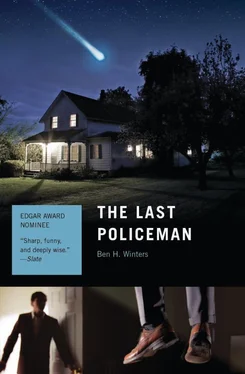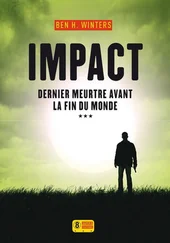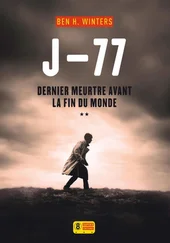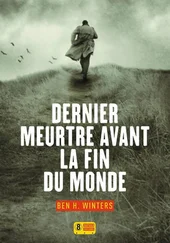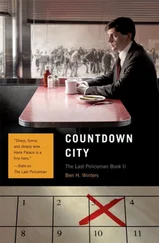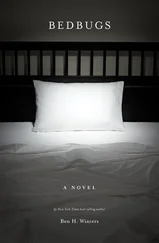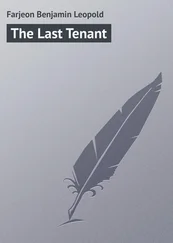“Hello?”
“William Eddes?”
“Bill. Who’s this?”
My teeth clench. I clutch my forehead with my palm. My stomach is a tight black knot.
“Sir, are you related to a woman named Naomi Eddes?”
The pause that follows is long and painful. This is her father.
“Sir?” I say at last.
“Who is this?” he says, his voice tight and cold and formal.
“My name is Detective Henry Palace,” I say. “I’m a policeman, in Concord, New Hampshire.”
He hangs up.
The musclewood leaf, the one I was watching, is gone. I look and I think I can see where it landed, a black smear in the slush of the lawn. I call Bill Eddes back and I do not get an answer.
There’s someone outside the phone booth, an agitated-looking old lady, bent over a small wire-frame shopping cart, the kind you get from the hardware store. I hold up one finger, smile apologetically, and I call Bill Eddes a third time, and I’m not surprised at all when there’s no answer, and that the phone abruptly stops ringing entirely. Naomi’s father, in his living room or kitchen, has yanked the phone from the wall. He’s slowly winding the slim gray cord around the phone, placing the phone on the shelf of a closet, like you put away something not to be thought of again.
“Sorry, ma’am,” I say, holding open the door for the old lady with the cart, and she asks, “What happened to your face?” but I don’t answer. I’m leaving the library, I’m chewing on an end of my mustache, holding one hand over my heart, palming it, feeling it beat—holy moly—this is it—holy moly—hurrying, running now, through the sodden lawn and back to the car.
* * *
It’s such a small town, Concord, sixty square miles taking in all the outskirts, and to drive just from downtown to the hospital with no other cars on the road? Ten minutes, which is not time enough to figure it all out, but is time enough to be sure that I will figure it out, that I’ve got it, that I will solve this murder—these murders—two murders, one murderer.
Here I am already, at the intersection of Langley Parkway and Route 9, looking up at Concord Hospital, where it sits like a child’s model of a castle on a hill, surrounded by its outbuildings and sprawling parking lots and office suites and clinics. The new wing, unfinished and never-to-be finished, piles of timber, panes of glass, frames of scaffolding hidden under tarps.
I pull in, sit in the parking lot, drum my fingers on the wheel.
Bill Eddes reacted how he did for a reason, and I know what the reason is.
That fact implies a second fact, which leads me on to a third.
It’s like you walk into a dark room, and there’s a sliver of pale light under a doorway on the opposite side. You open that door and it leads on to a second room, slightly brighter than the last, and there’s another door on the other side, with light under that one. And you keep going forward, one room after the other, more and more rooms, more and more light.
There’s a bank of spherical lights over the main doors, and all were lit the last time I was here, and now two are out, and that’s just it. The world is decaying bit by bit, every piece degrading at its own erratic rate, everything trembling and crumbling in advance, the terror of the coming devastation a devastation of its own, and each minor degradation has its consequences.
There’s no volunteer behind the horseshoe desk in the lobby today, just a family sitting on the couches in a small anxious knot, a mom and a dad and a kid, and they look up as I walk past, as if I might have the bad news they’re waiting for. I nod apologetically and then I stand there, turning in all directions, trying to orient myself, looking for Elevator B.
A nurse in scrubs rushes past me, stops at a doorway, mutters, “Oh, shoot,” and turns back the other way.
I think I’ve figured out which way I’m going, and I take two steps and experience a pulse of intense pain from my bandaged eye. I gasp, raise my hand to it, shake it off, no time just now.
The pain, because—what was it that Dr. Wilton told me while winding gauze around my head? The hospital is experiencing a shortage of palliative resources .
Facts are connecting themselves, glowing to life in my memory and then connecting themselves, one to the other, forming pictures like constellations. But there is no joy, I feel no pleasure at all, because my face hurts, and my side where the gun barrel dug into it, the back of my head where it banged against the wall, and I’m thinking, Palace, you dunce . Because if I could just go back in time and see things clearer, see them correctly quicker, I would have solved the Zell case—and there would be no Eddes case. Naomi would not be dead at all.
The elevator door slides open and I step inside.
No one else gets on; it’s just me, the tall quiet policeman with one eye, running his fingers up and down the sign, like a blind man reading Braille, trying to read the answers off the sign.
I ride it for a while, a few times up, a few times down. “Where,” I mutter to myself, “where could you be keeping it?” Because somewhere in this building is a place analogous to the doghouse at J. T. Toussaint’s, where presale product and ill-gotten gains are being hoarded. But a hospital is a place full of places—storerooms and surgeries, office suites and hallways—especially a hospital like this one, chaotic, chopped up, frozen midrenovation, it’s a place full of places.
At last I call it quits and get off in the basement and find Dr. Fenton in her office, down a short hallway from the morgue, a small and immaculate office decorated with fresh flowers and family pictures and a print of Mikhail Baryshnikov, the Bolshoi Ballet, 1973.
Fenton looks surprised and not pleased to see me, like I’m a garden pest, a raccoon maybe, she thought she was rid of.
“What?”
I tell her what I need done and ask her how long that takes, typically. She scowls, and says, “Typically?” like the word no longer has meaning, but I say, “Yes, typically.”
“Typically, between ten days and three weeks,” she says. “Although, the Hazen Drive staff being what it is, at present, I imagine it would be more like four to six weeks.”
“Okay—well—can you do it by the morning?” I ask, and I’m waiting for the scornful bray of laughter, bracing myself, thinking how I’m going to beg for it.
But she takes off her glasses, gets up from her chair, and looks at me carefully. “Why are you trying so hard to solve this murder?”
“I mean—” I hold up my hands. “Because it’s unsolved.”
“Okay,” she says, and tells me she’ll do it, as long as I promise never to call her or seek her out again, for any reason, forever.
And then, on my way back to the elevator, I find it, the place I was looking for, and I gasp, my jaw drops open and I literally gasp, and I say, “Oh, my God,” my voice echoing down the concrete basement hallway, and then I turn and run back to ask Fenton for one more thing.
* * *
My cell phone isn’t working. No bars. No service. It’s getting worse.
I can picture them in my mind: untended cell towers tilting over slowly and then falling, connecting cables drooping, dead.
I drive back to the library, put quarters in the meter. I wait in line for the phone booth, and when it’s my turn I reach Officer McConnell at home.
“Oh, hey, Palace,” she says. “You work upstairs. You want to tell me what on earth is going on over there? With the chiefs?”
“I don’t know.” Mysterious men in sunglasses. McGully, something’s fucked . “I need your help with something, Officer. Do you have any clothes that aren’t pants?”
Читать дальше
